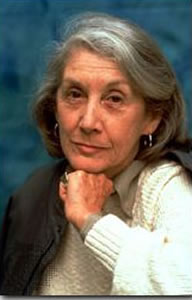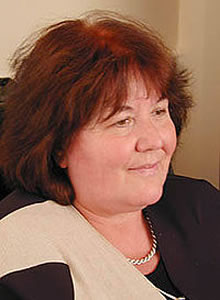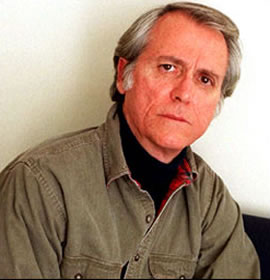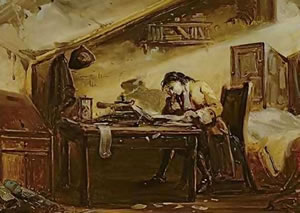De Zuidafrikaanse schrijfster Nadine Gordimer werd geboren op 20 november 1923 in Springs. Zie ook alle tags voor Nadine Gordimer op dit blog.
Uit: The Moment Before the Gun Went Off
“Marais Van der Vyver shot one of his farm labourers, dead.
An accident. There are accidents with guns every day of the week: children playing a fatal game with a father’s revolver in the cities where guns are domestic objects, and hunting mishaps like this one, in the country. But these won’t be reported all over the world. Van der Vyver knows his will be. He knows that the story of the Afrikaner farmer – a regional Party leader and Commandant of the local security commando – he, shooting a black man who worked for him will fit exactly their version of South Africa. It’s made for them. They’ll be able to use it in their boycott and divestment campaigns. It’ll be another piece of evidence in their truth about the country. The papers at home will quote the story as it has appeared in the overseas press, and in the back-and-forth he and the black man will become those crudely-drawn figures on anti-apartheid banners, units in statistics of white brutality against the blacks quoted at United Nations – he, whom they will gleefully call ‘a leading member’ of the ruling Party.People in the farming community understand how he must feel. Bad enough to have killed a man, without helping the Party’s,the government’s, the country’s enemies, as well.They see the truth of that. They know, reading the Sunday papers, that when Van der Vyver is quoted saying he is ’terribly shocked’, he will ‘look after the wife and children’, none of those Americans and English, and none of those people at home who want to destroy the white man’s power will believe him. And how they will sneer when he even says of the farm boy (according to one paper, if you can trust any of those reporters), ‘He was my friend. I always took him hunting with me: Those city and overseas people don’t know it’s true: farmers usually have one particular black boy they like to take along with them in the lands: you could call it a kind of friend, yes, friends are not only your own white people, like yourself, you take into your house, pray with in church and work with on the Party committee. But how can those others”

De Russische schrijfster en scenariste Viktoria Tokareva werd geboren op 20 november 1937 in Leningrad (Sint Petersburg). In 1958 voltooide zij haar studie piano aan het Conservatorium van Leningrad. In 1969 behaalde ze een graad draaiboek schrijven aan het Statelijk Instituut voor Cinematografie. Tijdens het werken als zanglerares aan een muziekschool voor kinderen en later als een televisie-editor begon ze te schrijven. Haar eerste verhaal „Dag zonder liegen“ werd gepubliceerd in 1964. Als gevolg hiervan werd haar aangeboden om een script voor een filmproject te schrijven. In 1968 verscheen haar eerste film Literatuuruur (Урок литературы). Meer verhalen zijn gepubliceerd in de volgende jaren in de toonaangevende Sovjet-literaire tijdschrift Novy Mir en Junost. In 1969 kwam haar eerste boek, „Over wat er niet was“ uit. In de eerste 15 jaar na de ineenstorting van het Sovjet-systeem werden meer dan 10 bundels gepubliceerd met oude en nieuwe verhalen.
Uit: Alle meine Feinde und andere Erzählungen (Vertaald door Angelika Schneider)
“Alle meine Feinde
Eines Morgens setzte ich mich an meinen Schreibtisch, nahm ein Blatt Papier und schrieb an den oberen Rand: Alle meine Feinde. Dann konzentrierte ich mich und zählte meine Feinde mit Namen auf.
anka
tanka
wanka
Ich dechiffriere:
Anka – das ist meine Haushälterin.
Tanka – das ist die Frau meines Vaters.
Wanka – das ist mein Nachbar auf der Datscha.
Anka – ist ein Feind im Inneren des Hauses.
Tanka – ist ein Feind außerhalb des Hauses.
Wanka – ist ein Feind direkt hinterm Zaun.
Meine Feinde sind mir ganz nah. Irgendwas ist da wohl schiefgelaufen. Man muss etwas tun. Aber was?
Soll ich in den Wald laufen zu den Partisanen? Und meine Feinde der Reihe nach umlegen?
Heutzutage ist es Mode, zum Psychoanalytiker zu gehen. Aber wozu die Zeit und das Geld aufwenden? Ich kann das selbst auseinandernehmen, ich bin meine eigene Psychoanalytikerin.
›Na dann los‹, sag ich mir, ›fangen wir an, schön einer nach dem anderen …‹
anka
Meine Tochter hat ein Kind geboren, »Vater anonym«, wie sie amtlich hat eintragen lassen. Es ist vom ›Erstbesten‹, sozusagen. Sie hat mir erklärt, dass das alles nach ihrer Mittlere-Reife-Prüfung passiert sei. Sie hat also noch eine zweite Art Reifeprüfung gemacht, die Prüfung zur Erwachsenen.
Meine Tochter verändert sich nur wenig. Ich erinnere mich noch genau an sie als Säugling, als Krabbelkind und als Sechsjährige. Jetzt ist sie achtzehn, hat noch immer ein Kindergesicht und einen Blick, der ins Nirgendwo gerichtet ist, als ob sie irgendwohin blickt, aber nichts sieht.“

Viktoria Tokareva (Leningrad, 20 november 1937)
De Amerikaanse schrijver Don DeLillo werd op 20 november 1936 geboren in New York City als zoon van Italiaanse immigranten. Zie ook alle tags voor Don DeLillo op dit blog.
Uit: Point Omega
„There was a man standing against the north wall, barely visible. People entered in twos and threes and they stood in the dark and looked at the screen and then they left. Sometimes they hardly moved past the doorway, larger groups wandering in, tourists in a daze, and they looked and shifted their weight and then they left.
There were no seats in the gallery. The screen was freestanding, about ten by fourteen feet, not elevated, placed in the middle of the room. It was a translucent screen and some people, a few, remained long enough to drift to the other side. They stayed a moment longer and then they left.
The gallery was cold and lighted only by the faint gray shimmer on the screen. Back by the north wall the darkness was nearly complete and the man standing alone moved a hand toward his face, repeating, ever so slowly, the action of a figure on the screen. When the gallery door slid open and people entered, there was a glancing light from the area beyond, where others were gathered, at some distance, browsing the art books and postcards. The film ran without dialogue or music, no soundtrack at all. The museum guard stood just inside the door and people leaving sometimes looked at him, seeking eye contact, some kind of understanding that might pass between them and make their bafflement valid. There were other galleries, entire floors, no point lingering in a secluded room in which whatever was happening took forever to happen.
The man at the wall watched the screen and then began to move along the adjacent wall to the other side of the screen so he could watch the same action in a flipped image. He watched Anthony Perkins reaching for a car door, using the right hand. He knew that Anthony Perkins would use the right hand on this side of the screen and the left hand on the other side. He knew it but needed to see it and he moved through the darkness along the side wall and then edged away a few feet to watch Anthony Perkins on this side of the screen, the reverse side, Anthony Perkins using the left hand, the wrong hand, to reach for a car door and then open it.
But could he call the left hand the wrong hand?“

De Engelse dichter en schrijver Thomas Chatterton werd geboren op 20 november 1752 in Bristol als zoon van een koster. Zie ook alle tags voor Thomas Chatterton op dit blog.
Picture of Autumn
When autumn, bleak and sun-burnt, do appear,
With his gold hand gilting the falling leaf,
Bringing up winter to fulfil the year,
Bearing upon his back the riped sheaf;
When all the hills with woody seed are white,
When levying fires, and lemes, do meet from far the sight:
When the fair apple, rudde as even sky,
Do bend the tree unto the fructile ground.
When juicy pears, and berries of black dye,
Do dance in air and call the eyne around;
Then, be the even foul, or even fair,
Methinks my hearte’s joy is stained with some care.
On Happienesse
MAIE Selynesse on erthes boundes bee hadde?
Maie yt adyghte yn human shape bee founde?
Wote yee, ytt was wyth Edin’s bower bestadde,
Or quite eraced from the scaunce-layd grounde,
Whan from the secret fontes the waterres dyd abounde?
Does yt agrosed shun the bodyed waulke,
Lyve to ytself and to yttes ecchoe taulke?
All hayle, Contente, thou mayde of turtle-eyne,
As thie behoulders thynke thou arte iwreene,
To ope the dore to Selynesse ys thyne,
And Chrystis glorie doth upponne thee sheene.
Doer of the foule thynge ne hath thee seene;
In caves, ynn wodes, ynn woe, and dole distresse,
Whoere hath thee hath gotten Selynesse.

Chatterton in zijn mansarde door John Joseph Barker
Zie voor nog meer schrijvers van de 20e november ook mijn vorige blog van vandaag
